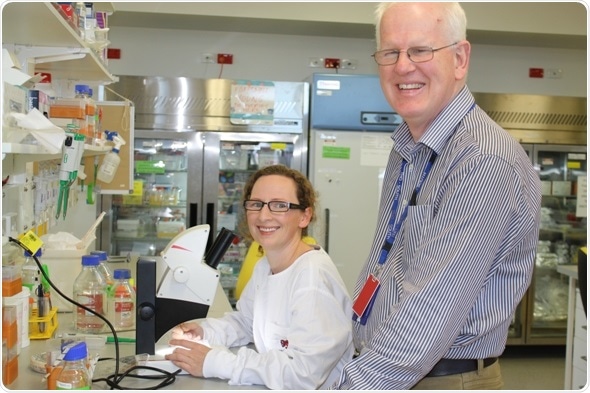Sep 6 2017
An innovative multiple sclerosis Research Fellowship designed to fast-track scientific knowledge into clinical practice has been awarded to two researchers at the University of Tasmania’s Menzies Institute for Medical Research.

The Director of Menzies, Professor Alison Venn, said the inaugural MS Research Australia – Macquarie Group Foundation Paired Fellowship program, totalling $750,000 for three years, was visionary in the way it brought laboratory and clinical researchers together to speed up the translation of research into practice.
“We are very proud that two of our senior scientists have been chosen through a competitive process to achieve this, the only nationally funded paired fellowship in multiple sclerosis (MS) research,” Professor Venn said.
“We have 20 years of research into multiple sclerosis at Menzies and this disease is a key area of focus for us. This funding will allow us to bring together two different streams of research that are investigating the disease. I would like to express our gratitude to MS Research Australia and the Macquarie Group Foundation for providing such an exciting opportunity.”
The fellowship has been awarded to Professor Bruce Taylor, a clinical researcher at Menzies and a neurologist at the Royal Hobart Hospital, and Dr Kaylene Young, a neuroscientist who has dedicated her career to studying the brain’s ability to repair itself through cellular processes.
Dr Matthew Miles, CEO, MS Research Australia, said:
Our new and innovative grant program launches a unique opportunity. It addresses one of the key recommendations identified in the 2013 McKeon Review into Health and Medical Research; that far more clinicians need to participate in the research process. This fellowship will also break down the barriers between the lab and the clinic and ensure faster translation of research discoveries into tangible health benefits for the community.
We understand this to be the first research practitioner/researcher fellowship fully funded by philanthropy and the community. We are thrilled that Dr Kaylene Young and Professor Bruce Taylor are the inaugural recipients. Their research will help expedite new treatments to protect and repair the nervous system; something that is desperately needed for people with MS.
Professor Taylor and his team have identified genetic mutations that they believe increase a person’s risk of developing MS, or in some cases may cause MS. Professor Taylor said the new research would move those discoveries into the laboratory environment to find out how the mutations affect cell health. “That knowledge can help us re-purpose existing drugs that could offset the effect of the mutation, and could be used in future clinical trials,” Professor Taylor said.
Dr Young has discovered that non-invasive brain stimulation, known as transcranial magnetic stimulation (TMS), can increase the ability of stem cells in the brain to generate new cells for nervous system repair. This fellowship will allow her to move this work into the early stages of clinical research. “We will perform a safety trial of TMS to ensure that this potential treatment can be safely administered to people with MS,” Dr Young said.